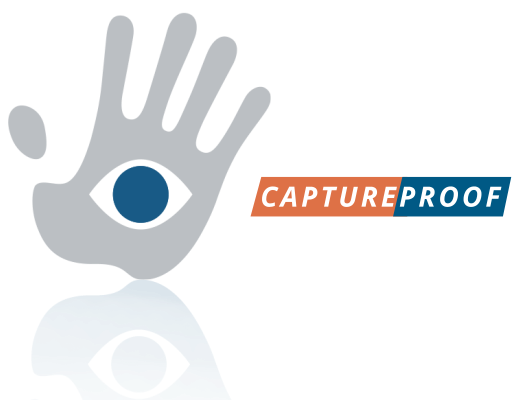The end of a beautiful Labor Day weekend was met by the very unfortunate news of the leaked photos of more than 100 female celebrities. Whether these photos were nude or not, it has raised serious questions, although not new questions, regarding the security of Apple’s iCloud.
The word “cloud” is thrown around quite a bit.
Keeping data in the cloud, literally means storing of data online in the cloud. — wherein a company’s data is stored in and is accessible from multiple distributed and connected resources.
But not all clouds are created equal. And we at CaptureProof want to reassure you, that the cloud we use to store – already encrypted data is Amazon Web Services – an industry leader in secure data storage and transmission.
How secure are they? AWS is the first commercial cloud provider authorized to handle the US Defense Department’s most sensitive, unclassified data. Satisfied?
What about your non-health related photos, videos, texts that are not stored in CaptureProof? We wanted to take some time today to review what best practices exist to help keep you and your personal data safe:
Staying Safe And How To Disable Apple iCloud
“Let’s be clear about one thing: right now we don’t yet know whether the nude celebrity photos hacking scandal can be blamed entirely on security vulnerabilities in Apple iCloud. Certainly this is being widely circulated and it was my first thought on Twitter last night, but there is no proof.What is beyond doubt, however, is the hacks have made a lot of people uncomfortable about using Apple’s iCloud backup service so for those of you keen to act this is how you get your data off it.
The Kill
WARNING: Be sure to have your photos saved on your PC (if you wish) before you do this.
To start: go to either the Photo Stream tab in your photo gallery in iOS or the Photo Stream option in iPhoto on Mac OS to view existing photos in Photo Stream. Here you can manually delete existing individual photos or whole albums.
Then to stop new uploads:
- Go to the settings menu on your iPhone or iPad (‘System Preference’ on Mac OS)
- Open the ‘iCloud’ category
- Switch off Photo Stream (which automatically uploads photos to iCloud)
- Repeat this on all your Apple devices
The Faster, Less Drastic Step – Two Factor Authentication
‘TFA’ is offered by Apple as well as rivals Google , Microsoft and social media networks like Facebook and Twitter. TSV greatly increases security of your data as it requires both your password and a PIN provided by one of your devices or using SMS before it can be accessed from an unknown device.
The problem is the small inconvenience of this extra step means many don’t bother to switch it on. Myself and any security expert will tell you it is worth the extra hassle. So:
- Go to My Apple ID
- Select ‘Manage your Apple ID and sign in’
- Select ‘Password and Security’
- Under ‘Two-Step Verification’, select ‘Get Started’ and follow the onscreen instructions.
You can also find guides to enable two step verification here for Google, Twitter, Facebook and Dropbox.
Stay Calm
It won’t take long to discover whether yesterday’s hacks were through weak user security or a company vulnerability, but it is important to keep calm. Speaking to Chris Boyd, Malware Intelligence Analyst at Malwarebytes, he stresses there is a clear difference between this incident and the usual Cloud hacking attempts.
“This is an intriguing twist on the usual personal data breach story,” he explained. “Whereas typically value is created by packaging up vast numbers of unknown people’s information, in this case the individual responsible has allegedly targeted a small set of extremely valuable targets.”
As it stands there is therefore no reason to believe the hacks will widen and with the Cloud widely heralded as the future of computing the main players will be desperate to take the necessary steps to regain user confidence. And fast.”
Originally published in Forbes by Gordon Kelly
To read more: http://www.newyorker.com/tech/elements/jennifer-lawrence-leak
Who doesn’t like some good celebrity gossip every now and then? But when a nude photo “leaks” because someone hacked into Apple’s iCloud – this is cause for concern for everyone.

In a story by TIME:
- 37.8% of all Americans above the age of 13 use iPhones
- iOS is being used the most on the internet with 61.4%
- iOS is also the most widely used in business with 62%
- And in 2014, the number of American iPhone users is projected to reach 63.2 million
With the potential for 63.2 million users being hacked, it’s only instinctive to be worried over our personal privacy. Could this happen to me? Is my information really protected? How easily can people get into my account? What can I do to prevent this from happening? As the story above mentioned, there are various ways to take the first steps in protecting your information.
As for your medical information, trust in CaptureProof. With our industry-leading security, and HIPAA compliant app we believe that medical information is something that should never be leaked. CaptureProof uses Amazon Web Services – the most secure Cloud in the industry. Track your health, and share with your Clinician – easy, secure, and empowering.
#HealthIT #HealthTech #Celebrity #InTheNews #Security #cloud #iCloud #AWS #Privacy

